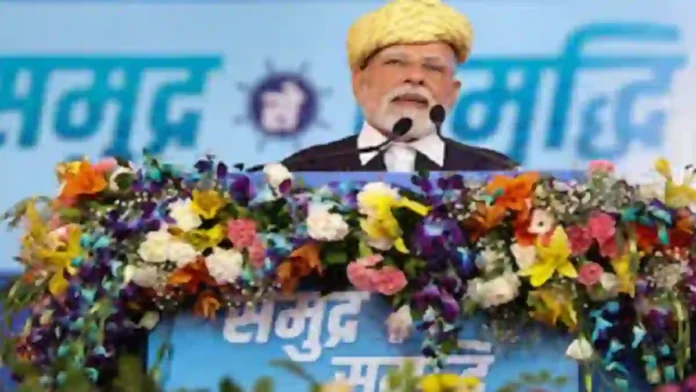Prime Minister Narendra Modi, addressing a public gathering in Bhavnagar, Gujarat, strongly underlined self-reliance as India’s defining priority, framing dependence on foreign nations as the country’s “real enemy.”
He asserted that India has no major adversary globally but suffers when excessive reliance on other countries undermines national strength, productivity, and resilience.
Read- TEJAS MK-1S Update: HAL Says 10 Jets Are Ready For Delivery
Modi linked foreign dependence directly to national failure, stating that true prosperity and global peace can only be secured by building domestic capabilities across all sectors.
His remarks came amid escalating strain from U.S. economic policies, including President Donald Trump’s decision to impose a $1,00,000 surcharge on H‑1B visa applications—disproportionately impacting India’s workforce, which constitutes nearly three‑fourths of visa holders—and the continuation of steep tariffs on Indian imports.
In stressing economic independence, Modi underscored the need for India to produce everything from “chips to ships,” emphasising the urgency to reduce vulnerability in critical technologies, supply chains, and industries.
He particularly pointed to semiconductor manufacturing, electronics, shipping, and broader industrial ecosystems as areas where self-sufficiency is crucial. Highlighting maritime strength as a pillar of India’s rise, Modi described ports as the backbone of future trade and global power status.
Read- Russia Pitches Su‑57E To India, Invites IAF Test Pilots For Evaluation Flights
Read- Pakistan Says Its Nuclear Program Can Be Made Available To Saudi Arabia Under Defence Pact
He announced reforms such as “One Nation, One Document,” designed to simplify paperwork and accelerate efficiency in port-led logistics, thereby advancing India’s position as a maritime hub. The Prime Minister also contrasted this vision with past Congress-led governments, accusing them of suppressing entrepreneurial and technological talent under restrictive frameworks like the License Raj.
A significant element of Modi’s speech focused on the defence sector, where he cited the indigenously built aircraft carrier INS Vikrant as a symbol of self-reliant capability. He noted that over 40 ships and submarines have been inducted into India’s fleet, with the vast majority developed domestically, showcasing India’s industrial competence in critical security domains.
Modi also highlighted economic concerns in the shipping sector, stating that the cost of relying on foreign shipping firms is now nearly equivalent to the entire national defence budget, thereby underscoring the financial and strategic risks of dependence.
By tying together defence, trade, industrial growth, and technological sovereignty, Modi constructed an expansive vision of Atmanirbhar Bharat, presenting self-reliance as both a shield against external shocks and a driver of India’s long-term global rise.
Agencies




